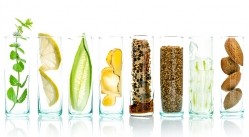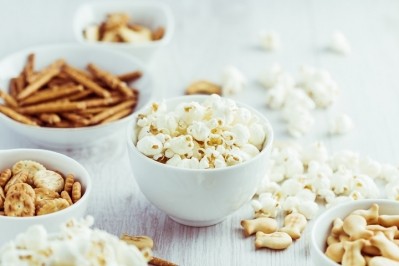'I think 'natural' still resonates with consumers, whereas 'clean’ is a bit inside the beltway for me'

You can delve into the weeds with us at FoodNavigator-USA’s FREE online Natural and clean label trends event on March 20, and hear from Annie's, Simple Mills, Luvo, Otis Spunkmeyer, Hartman Group, Pollock Communications, Venable, Ingredion, DuPont, Kemin, Foodscape Group, and Avure HPP.
But to give you a flavor of some of the issues, here’s what some experts think, from Chobani’s chief marketing and brand officer Peter McGuinness, to the founders of the Detox Project and the Clean Label Project.
NATURAL: DOES IT STILL RESONATE?
Peter McGuinness, Chobani: Brands have been using and abusing the term natural and trying to redefine what it means for years, but I don’t think that the word natural is bankrupt. I think it still resonates with consumers whereas 'clean’ is a bit inside the beltway for me, a bit void of meaning, a bit cute, I don’t know what it means and most consumers don’t know what it means.
Jim Tonkin, Healthy Brand Builders: There have been many lawsuits over ‘natural,’ it’s become meaningless and doesn’t have the value proposition to consumers anymore.
Only on occasion do these lawsuits have any validity, but they have forced people to ask more questions and take supply chain verification seriously because you need to know what’s in your products, how they’re made. Some people are happy with alcohol extraction [for natural extracts], others say water extraction is the only way. Is there glyphosate residue, are you using propylene glycol in your natural flavor, because guaranteed there are people out there trying to bring you down.
Jeff Hilton, Brandhive: I think the words clean and natural mean something different to every consumer, so I think they are less useful than terms such as ‘plant-based’ or ‘botanicals,’ which are more specific, and also make people think, oh yes, back to nature. You have to build a story around words like clean or natural if you’re going to use them on your packaging, how are they clean or natural?
Natural and organic don’t look like they used to, he adds: It’s more clean simple strong colors and graphics, minimalist, more youthful and contemporary.
Mintel Private Label Food and Drink Trends, US, January 2019 report: The 'all-natural' claim appeared on 2.9% of private label food launches in 2018 compared with 9.2% of private label food launches in 2013.
Natural claims and the FDA: Although the FDA has maintained radio silence on the ‘natural’ issue since its November 2015 call for comments on natural claims, FDA commissioner Dr Scott Gottlieb said in a speech in March 2018 that there was a lack of clarity around the term 'natural,' adding: "We’ll have more to say on the issue soon."
CLEAN LABEL: WHAT DOES IT MEAN, AND DO EXPECTATIONS VARY BY BRAND OR PRODUCT CATEGORY?
Greg Tompkins, Otis Spunkmeyer: I don’t know that any customer has come to us and said we need to go Non-GMO for our Otis Spunkmeyer cookies and cakes, whereas for the La Brea brand [owned by parent company Aryzta], going Non-GMO has been really important… clean label expectations seem to be brand-specific.
We have had an M&M cookie for years, and everyone knows M&Ms are loaded with FD&C colors, so we went out and sourced a naturally colored M&M and put it in the cookie, and people abandoned that cookie like it was the Titanic; it was appalling, the drop in sales. The minute we brought back the M&Ms, the cookie leapt back to its former glory. People know they are full of artificial ingredients, but they want their M&Ms, so there's a lesson there. I think the pendulum may swing back a notch from ultra clean label to what I call 'common sense clean label.’
Stephanie Mattucci, Mintel: The term ‘clean’ is still pretty confusing… We talked through a couple of product examples with consumers [that featured the word ‘clean’ on the front of the pack] and one woman commented that she thought it looked like a cleaning product, for example, while others stated confusion overall about what clean may mean.
There’s a shift… [eating healthily] it’s not just nutrition for them [Millennials]. Healthy for them encompasses many things including some of those clean label attributes. They are looking at freshly made, or minimally processed, or free from artificial ingredients as part of their overall definition of healthy, regardless of the nutrition.
Jeff Hilton, Brandhive: In focus groups we did recently, people said they don’t care too much about the number of ingredients, just whether they recognize then and can pronounce them.
In the industry, the term ‘clean label’ keeps evolving. Originally it was no artificial sounding ingredients, clean label 1.0 if you like, and now it’s clean label 2.0: What about sourcing, transparency, how did you produce this ingredient? It’s going a level deeper.
Jackie Bowen, Clean Label Project: We know that consumers are paying attention to the conversation about heavy metals, especially in foods for infants and young children and it’s an issue where I believe that consumer advocacy may result in regulatory change over time. It might be on the periphery of consumer awareness now, but we think the next frontier of food safety is food toxicity.”
ARE NATURAL FLAVORS CONSIDERED ‘ALL NATURAL’?
Bill Acevedo, Wendel, Rosen, Black & Dean: I think that it is fair to say that natural flavors are on the radar for scrutiny. It’s a foreseeable offshoot of the ‘All Natural’ complaints, and I think that plaintiff’s attorneys are drilling down ever deeper into labels and ingredient lists to find infractions.
While suppliers often guard their natural flavors formulations as proprietary information, the prudent manufacturer should insist on a written representation that a natural flavor does not contain any synthetic sub-ingredient from the supplier before it makes any ‘natural’ claim.
WILL GLYPHOSATE-FREE TAKE OFF?
Henry Rowlands, The Detox Project: We launched in May 2017, and we got quite a lot of interest, but from March/April 2018 there has just been a flood of inquiries [about the glyphosate-free seal]. We’ve had some of the biggest brands in the US and the world contacting us, not just for certification, but more often for an understanding of supply chain pesticide testing.
WHERE ARE NON-GMO CLAIMS GOING NEXT?
Jeff Hilton, Brandhive: I think Non GMO claims are pretty unimportant compared to other things and I think it’s peaked, it’s on the decline.
Jim Tonkin, Healthy Brand Builders: [Before dismissing biotech crops] the natural products industry should think more carefully about what sustainability means and how we are going to feed everyone.
Peter McGuinness, Chobani: Candidly I think the GMO issue is very confusing to people.
DO CERTIFICATIONS IMPRESS SHOPPERS?
Jeff Hilton, Brandhive: It’s an alphabet soup mess out there, consumers recognize the organic logo, but in general they aren’t certification shopping.
WILL CONSUMERS SEE FOODS MADE FROM MICROBES AS ‘NATURAL’? AND WHAT ABOUT CELL-CULTURED MEAT AND HIGH-TECH PLANT-BASED MEAT ALTERNATIVES?
Thomas Jonas, Sustainable BioProducts: There is this growing realization that microbes are pretty damn efficient. There is a revolution going on in protein production and in the future I don’t think people care if the ‘cells’ are from cows or microbes. No one is attached to killing cows, as Pat Brown would say [the founder of plant-based meat co Impossible Foods], they just like the meat.
We tend to forget how quickly consumers adapt to new things. At one time in France, my home country, you could only buy yogurt from the pharmacy. The way people were eating 20-30 years ago is very different to today, so I think there is a lot more openness to new things than consumers are given credit for.
REGISTER HERE for the March 20 FoodNavigator-USA Natural and clean label trends online event, and hear from Annie's, Simple Mills, Luvo, Otis Spunkmeyer, Hartman Group, Pollock Communications, Venable, Ingredion, DuPont Nutrition & Health, Kemin, Foodscape Group and JBT/Avure.
Click HERE for more details about the event, which is sponsored by Ingredion, DuPont Nutrition & Health, and Kemin, and supported by Cargill, herbafood and Farbest Brands.





























